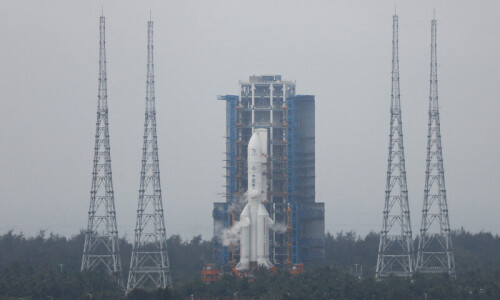ANKARA: Turkish forces swept into Syria overnight to rescue about 40 soldiers who had been surrounded for months by Islamic State (IS) militants while guarding the tomb of a revered Turkish figure.
The Syrian government described the operation as act of “flagrant aggression” and said it would hold Ankara responsible for its repercussions.
The action, which involved tanks, drones and reconnaissance planes as well as several hundred ground troops, was the first such incursion by Turkish troops into Syria since the start of the civil war there nearly four years ago.
Also read: Turkey warns will hit back if IS attacks Syria exclave
The military said no clashes took place during the operation although one soldier had been killed in an accident.
The 38 soldiers who had been guarding the tomb of Suleyman Shah, grandfather of the founder of the Ottoman Empire, were brought safely home. The tomb, on a site within Syria that Ankara considers sovereign territory as agreed in a 1921 treaty, was relocated.
Normally, the detachment is rotated every six months but the last one was trapped there for eight months by IS fighters.
Prime Minister Ahmet Davutoglu told a news conference that Turkey had not sought permission or assistance for the mission but had informed allies in the coalition against IS once it began. “This was an extremely successful operation with no loss to our rights under international law,” he said, flanked by the chief of the military and the defence minister.
The Syrian government said in a statement that Turkey would be held responsible for its breach of the treaty after failing to wait for an agreement from Damascus before proceeding with the operation.
The Turkish government had informed the Syrian consulate in Istanbul about the operation but had not awaited Syria’s agreement, it said, adding that the operation was a violation of the 1921 agreement.
A Turkish security source said the operation was conducted via the Syrian Kurdish border town of Kobani with the support of local Kurdish authorities. Kurdish forces, backed by US-led air strikes, drove IS from Kobani last month.
The Turkish foreign ministry said the tomb had been temporarily moved to a new site within Syria north of the village of Esmesi close to the Turkish border.
Mr Davutoglu said about 100 military vehicles, including 39 tanks, were involved along with 572 military personnel including special forces commandos. Turkish fighter jets were on alert during the mission but did not need to be deployed, he said.
Turkey has been reluctant to take an active role in the US-led military campaign against IS, partly because it wants to see the military action target Syrian government forces as much as the insurgents.
But the Turkish government said late last year that IS militants were advancing on the mausoleum, perched on the banks of the Euphrates river and made Turkish territory under a treaty signed with France in 1921, when France ruled Syria.
Mr Davutoglu had repeatedly said that Turkey would retaliate against any attack on the tomb, which was located 37km from the Syrian border before being moved overnight.
“Countries which do not look after their historic symbols cannot build their future,” he said on Sunday.
The Syrian government statement said the fact that IS had not attacked the tomb “confirmed the depth of the ties between the Turkish government and this terrorist organisation”.
Syria accuses Turkey of supporting insurgent groups that have seized control of wide areas of northern and eastern Syria, including IS.
Two operations were carried out simultaneously as part of what was dubbed operation “Shah Euphrates”, Mr Davutoglu said, one to Suleyman Shah and the other to secure the area around Esmesi.
He said the remaining buildings at the original site were destroyed to prevent their use after the remains were removed.
Turkish soldiers raised the Turkish flag at the site where the tomb was relocated. Mr Davutoglu said it would be returned to its previous location once conditions allowed.
IS and other Islamist groups have destroyed several tombs and mosques in Syria.
Suleyman Shah was the grandfather of Osman I who founded the Ottoman Empire in 1299. Travelling through modern-day Syria, he fell off his horse and drowned in the Euphrates near the site of the mausoleum, according to historians.
Published in Dawn February 23rd , 2015
On a mobile phone? Get the Dawn Mobile App: Apple Store | Google Play











































